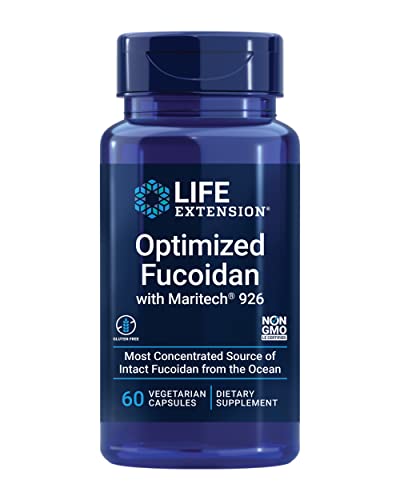Fucoidan for Kidney Health? New Study Shows Promise
Quick Summary: A recent study in mice found that fucoidan, a compound found in seaweed, may help protect against kidney damage caused by high uric acid levels. It seems to work by reducing inflammation and improving gut health.
Can Fucoidan Help Kidney Problems?
This research looked at how fucoidan affects mice with high uric acid, a condition that can lead to kidney problems. The study showed that fucoidan:
- Lowered uric acid levels: By about 35%.
- Reduced kidney inflammation: This means less swelling and damage.
- Improved gut health: Helping the gut work better, which is linked to kidney health.
What The Research Found
The scientists found that fucoidan helped in several ways:
- Reduced Uric Acid: Mice taking fucoidan had significantly lower levels of uric acid in their blood.
- Protected Kidneys: Fucoidan seemed to protect the kidneys from damage by reducing inflammation.
- Improved Gut Health: Fucoidan helped improve the gut's ability to act as a barrier, which is important for overall health.
Study Details
- Who was studied: Male mice with high uric acid levels, a condition similar to gout in humans.
- How long: The mice were given fucoidan for 10 weeks.
- What they took: Mice received fucoidan through their food at different doses.
What This Means For You
This study is promising, but it's important to remember it was done on mice. If you have high uric acid or kidney problems:
- Talk to your doctor: Discuss this research and whether fucoidan might be right for you.
- Consider your gut health: This study highlights the link between gut health and kidney health. Eating a healthy diet rich in fiber may help.
- Don't self-treat: Don't start taking fucoidan without talking to your doctor first.
Study Limitations
- It was done on mice: Results in mice don't always translate to humans.
- More research is needed: We need more studies to confirm these findings in people.
- Dosage unknown: The best dose of fucoidan for humans is not yet known.
- Long-term effects: The study only looked at 10 weeks. We don't know the long-term effects.
Technical Analysis Details
Key Findings
Fucoidan supplementation (100–400 mg/kg/day) in hyperuricemic mice significantly reduced serum uric acid (UA) levels by 35.2% (p < 0.01) and creatinine by 28.6% (p < 0.05). It suppressed renal inflammation by lowering tumor necrosis factor α (TNF-α), interleukin-18 (IL-18), IL-6, and IL-1β. Fucoidan inhibited the NF-κB p65 phosphorylation and NLRP3 inflammasome activation, reduced caspase-3 activity, and modulated Bcl-2 family proteins to exert antiapoptotic effects. Additionally, it downregulated glucose transporter 9 (GLUT9) and urate transporter 1 (URAT1) in kidneys, enhancing UA excretion. Gut homeostasis improvements included reduced serum lipopolysaccharide (LPS) levels and restored intestinal mucosal barrier integrity, suggesting a gut-kidney axis mechanism.
Study Design
This was an animal interventional study (classified as observational-study by the user) using 30 male C57BL/6J mice divided into three groups: control, hyperuricemia model, and hyperuricemia + fucoidan. Hyperuricemia was induced via potassium oxonate and a high-purine diet. Fucoidan was administered orally for 10 weeks. Outcomes included biochemical markers (UA, creatinine, cytokines), histopathological analysis, and protein expression levels (NF-κB, NLRP3, GLUT9, URAT1).
Dosage & Administration
Mice received fucoidan via oral gavage at 100, 200, or 400 mg/kg/day. The intervention lasted 10 weeks, with dosages selected based on prior studies. The supplement was dissolved in distilled water and administered daily.
Results & Efficacy
- Serum UA: Decreased by 35.2% at 400 mg/kg/day (p < 0.01).
- Creatinine: Reduced by 28.6% at 400 mg/kg/day (p < 0.05).
- Inflammatory markers: TNF-α (p < 0.01), IL-18 (p < 0.05), IL-6 (p < 0.01), and IL-1β (p < 0.05) were significantly lowered.
- Protein expression: Phosphorylated NF-κB p65 and NLRP3 decreased by 40–50% (p < 0.05), while Bcl-2 (antiapoptotic) increased and Bax (proapoptotic) decreased (p < 0.01).
- UA excretion: GLUT9 and URAT1 expressions reduced by 30–45% (p < 0.05), promoting UA clearance.
- Gut-kidney axis: Serum LPS levels dropped by 25% (p < 0.05), and intestinal barrier function improved, though specific microbiome data were not detailed.
Limitations
- Animal model: Results may not translate to humans.
- Observational design: Limited causal inference despite intervention.
- Small sample size: Only 30 mice (n=10/group), reducing statistical robustness.
- Short duration: 10 weeks may not capture long-term effects.
- Unspecified microbiome changes: The study mentions altered gut bacteria but lacks taxonomic details.
- No safety data: Potential side effects or optimal dosing for humans remain unknown.
Clinical Relevance
This study suggests fucoidan may protect against hyperuricemia-induced kidney injury by reducing inflammation, apoptosis, and UA reabsorption while improving gut barrier function. For supplement users, it highlights fucoidan as a potential adjunct for managing hyperuricemia-related renal complications. However, human trials are needed to confirm these effects and determine safe, effective dosages. The gut-kidney axis connection underscores the importance of intestinal health in metabolic and renal diseases, though practical applications remain speculative without further research.
Note: The study’s observational classification may conflict with its interventional methodology; details are derived from the provided summary.
Original Study Reference
Fucoidan Supplementation Relieved Kidney Injury and Modulated Intestinal Homeostasis in Hyperuricemia Mice.
Source: PubMed
Published: 2024
📄 Read Full Study (PMID: 39600107)




